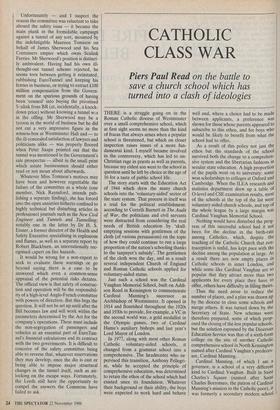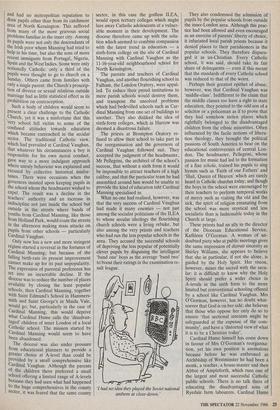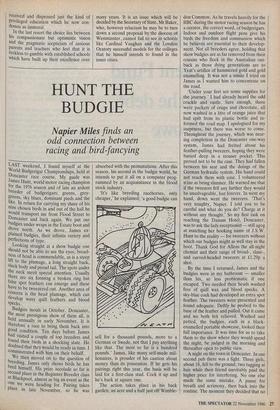CATHOLIC CLASS WAR
Piers Paul Read on the battle to
save a church school which has turned into a clash of ideologies
THERE is a struggle going on in the Roman Catholic diocese of Westminster over a small comprehensive school, which at first sight seems no more than the kind of fracas that always arises when a popular school is threatened, but which on closer inspection raises issues of a more fun- damental kind. I myself became involved in the controversy, which has led to un- Christian rage in priests as well as parents, because my eldest son went to the school in question until he left by choice at the age of 16 for a taste of public school life.
The story starts with the Education Act of 1944 which drew the many church schools into the 'voluntary-aided' sector of the state system. That process in itself was a trial for the political establishment: according to Correlli Barnett in The Audit of War, the politicians and civil servants were distracted from considering the real needs of British education by 'skull- emptying sessions with gentlemen of the cloth (of various persuasions) on the topic of how they could continue to run a large proportion of the nation's schooling thanks to the taxpayer's subsidy'. The gentlemen of the cloth won the day, and as a result several independent Church of England and Roman Catholic schools applied for voluntary-aided status.
Just such a school was the Cardinal Vaughan Memorial School, built on Addi- son Road in Kensington to commemorate Cardinal Manning's successor as Archbishop of Westminster. It opened in 1914 and flourished throughout the 1920s and 1930s to provide, for example, a VC in the second world war, a gold medallist in the Olympic games, two of Cardinal Hume's auxiliary bishops and last year's Lord Mayor of London.
In 1977, along with most other Roman Catholic voluntary-aided schools, it changed from a grammar school into a comprehensive. The headmaster who su- pervised this transition, Anthony Pellegri- ni, while he accepted the principle of comprehensive education, was determined to retain the ethos of the school which had existed since its foundation. Whatever their background or their ability, the boys were expected to work hard and behave well and, where a choice had to be made between applicants, a preference was shown for those whose parents appeared to subscribe to this ethos, and for boys who would be likely to benefit from what the school had to offer.
As a result of this policy not just the ethos but the standards of the school survived both the change to a comprehen- sive system and the libertarian fashions in secular state education. A high proportion of the pupils went on to university: some won scholarships to colleges at Oxford and Cambridge. When the ILEA research and statistics department drew up a table of 0-level and CSE examination results, most of the schools at the top of the list were voluntary-aided church schools, and top of the whole league by a large margin was Cardinal Vaughan Memorial School.
Nothing would have disturbed the prog- ress of this successful school had it not been for the decline in the birth-rate among Catholics, which, despite the teaching of the Catholic Church that con- traception is sinful, has kept pace with the decline among the population at large. As a result there are now empty places in Catholic schools in inner London, and while some like Cardinal Vaughan are so popular that they attract more than two applicants for every place they have to offer, others have difficulty in filling theirs.
Thus the need arose to reduce the' number of places, and a plan was drawn up by the diocese to close some schools and merge others. It was turned down by the Secretary of State. New schemes were therefore prepared, some of which prop- osed the closing of the less popular schools, but the solution espoused by the Diocesan Education Service was that of a sixth-form college on the site of another Catholic comprehensive school in North Kensington named after Cardinal Vaughan's predeces- sor, Cardinal Manning.
Cardinal Manning, of which I am a governor, is a school of a very different kind to Cardinal Vaughan. Built in Saint Charles's Square (named after Saint Charles Borromeo, the patron of Cardinal Manning's mission to the Catholic poor), it was formerly a secondary modern school and had no metropolitan reputation to draw pupils other than from its catchment area of North Kensington. This suffered from many of the more grievous social problems familiar in the inner city. Among its pupils were not only the descendants of the Irish poor whom Manning had tried'to help in his time, but also the sons of more recent immigants from Portugal, Nigeria, Spain and the West Indies. Some were only notionally Catholic: only a third of the pupils were thought to go to church on a Sunday. Others came from families with only a single parent: the Church's proscrip- tion of divorce or sexual relations outside marriage had as little statistical effect as its prohibition on contraception. Such a body of children would seem to present a clear challenge to the Catholic Church, yet it was a misfortune that this very school fell victim to some of the confused attitudes towards education which became entrenched in the secular sector. The traditional Catholic view, which had prevailed at Cardinal Vaughan, that whatever his circumstances a boy is responsible for his own moral conduct, gave way to a more indulgent approach where unruly behaviour was explained and excused by collective historical misfor- tunes. There were occasions when the governors insisted upon keeping pupils in the school whom the headmaster wished to expel. The result was a decline in the teachers' authority and an increase in indiscipline not just inside the school but outside in the streets where bands of youths from Cardinal Manning, like those from Holland Park, would roam the streets in the afternoon making mass attacks on pupils from other schools — particularly Cardinal Vaughan. Only now has a new and more stringent regime started a reversal in the fortunes of Cardinal Manning; but because of the falling birth-rate its present improvement cannot make up for its past unpopularity. The expression of parental preference has set into an inexorable decline. If the diocese was to reduce the number of places available by closing the least popular schools, then Cardinal Manning, together with Saint Edmund's School in Hammers- mith and Saint George's in Maida Vale, would go; but, particularly in the case of Cardinal Manning, this would deprive what Cardinal Hume calls the 'disadvan- taged' children of inner London of a local Catholic school. The mission started by Cardinal Manning would seem to have been abandoned.
The diocese was also under pressure from educational planners to provide a greater choice at A-level than could be provided by a small comprehensive like Cardinal Vaughan. Although the parents of the children there preferred a small school offering a limited range of A-levels because they had seen what had happened to the huge comprehensives in the county sector, it was feared that the same county sector, in this case the godless ILEA, would open tertiary colleges which might lure away Catholic adolescents at a vulner- able moment in their development. The diocese therefore came up with the solu- tion which seemed to combine compassion with the latest trend in education — a sixth-form college on the site of Cardinal Manning with Cardinal Vaughan as the 11-16-year-old neighbourhood school for North Kensington.
The parents and teachers of Cardinal Vaughan, and another flourishing school in Fulham, the London Oratory, were appal- led. To reduce their proud institutions to mere parish schools would destroy them, and transpose the unsolved problems which had bedevilled schools such as Car- dinal Manning from one set of buildings to another. They also disliked the idea of sixth-form colleges, which in Harrow was deemed a disastrous failure.
The priests at Brompton Oratory re- fused to allow their school to take part in the reorganisation and the governors of Cardinal Vaughan followed suit. They accepted the judgment of the headmaster, Mr Pellegrini, the architect of the school's success, that without a sixth form it would be impossible to attract teachers of a high calibre; and that the particular team he had assembled around him would be unable to provide the kind of education taht Cardinal Manning specialised in.
What no one had realised, however, was that the very success of Cardinal Vaughan had made it many enemies — not just among the socialist politicians of the ILEA to whose secular ideology the flourishing church schools were a living rebuke, but also among the very priests and teachers who had run the less popular schools in the area. They accused the successful schools of depriving the less popular of potentially clever pupils by disguising the intelligent `band one' boys as the average 'band two' to boost their ratings in the examination re- sult league.
'I had no idea they played the Soviet national anthem at close-down.' They also condemned the admission of pupils by the popular schools from outside the inner-London area. Although this prac- tice had been allowed and even encouraged as an exercise of parents' liberty of choice, it infuriated local parish priests because it denied places to their parishioners in the popular schools. They therefore dispara- ged it as un-Christian. Every Catholic school, it was said, should take its fair share of delinquents — even if this meant that the standards of every Catholic school was reduced to that of the worst.
Perhaps their greatest epithet of abuse, however, was that Cardinal Vaughan was `middle-class'. Indifferent to the claim that the middle classes too have a right to state education, they pointed to the odd son of a solicitor or a policeman as if to prove that they had somehow stolen places which rightfully belonged to the disadvantaged children from the ethnic minorities. Often influenced by the facile notions of libera- tion theology, they brought the political passions of South America to bear on the educational controversies of central Lon- don. The headmaster, Pellegrini, whose passion for music had led to the formation of a fine schola, trained his pupils to sing hymns such as 'Faith of our Fathers' and `Hail, Queen of Heaven' which are rarely heard in Catholic churches today; and though the boys in the school were encouraged by their teachers to perform temporal works of mercy such as visiting the old and the sick, the spirit of religion emanating from the school was more mystical and less socialistic than is fashionable today in the Church at large.
These priests had an ally in the director of the Diocesan Educational Service, Kathleen O'Gorman. A woman of un- doubted piety who at public meetings gives the same impression of distrait sincerity as Shirley Williams, she appears to believe that she in particular, if not she alone, is guided by the Holy Spirit. Her vision, however, mixes the sacred with the secu- lar: it is difficult to know why the Holy Spirit should prefer a wider choice in A-levels in the sixth form to the more limited but conventional schooling offered by a school like Cardinal Vaughan. Mrs O'Gorman, however, has no doubt what- soever that God is on her side: she believes that those who oppose her only do so to ensure 'that sectional interests might be safeguarded at the expense of the com- munity', and have a 'distorted view of what it is to be a Christian today'.
Cardinal Hume himself has come down in favour of Mrs O'Gorman's reorganisa- tion, yet his own position is anomalous because before he was enthroned as Archbiship of Westminster he had been a monk, a teacher, a house-master and then Abbot of Ampleforth, which runs one of the largest and most successful Catholic public schools. There is no talk there of educating the disadvantaged sons of Ryedale farm labourers. Cardinal Hume received and dispensed just the kind of privileged education which he now con- demns as immoral.
In the last resort the choice lies between his compassionate but optimistic vision and the pragmatic scepticism of anxious parents and teachers who feel that it is reckless to gamble with established schools which have built up their excellence over many years. It is an issue which will be decided by the Secretary of State, Mr Baker, who, however reluctant he may be to turn down a second proposal by the diocese of Westminster, cannot fail to see in schools like Cardinal Vaughan and the London Oratory successful models for the colleges that he himself intends to found in the inner cities.




























































 Previous page
Previous page